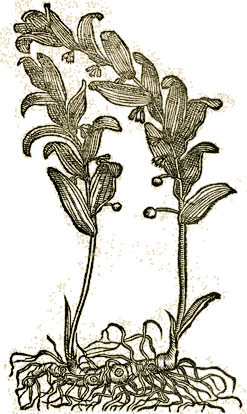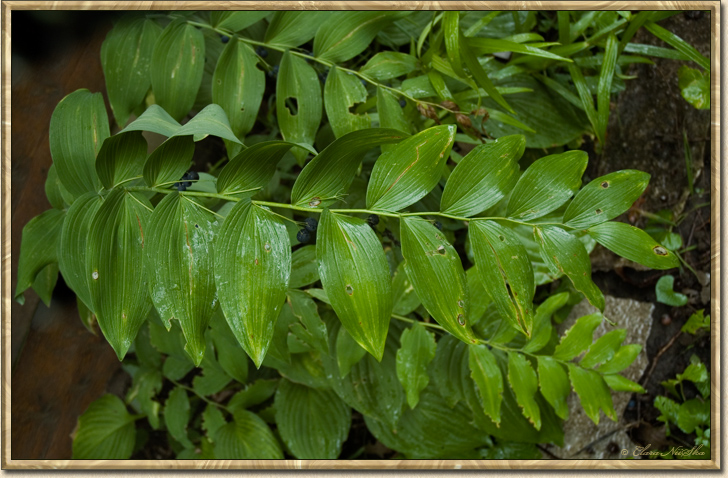|
|
|
VII. The Indispensable Muscular and Skeletal Remedy.
Men and women are subject to injury of the locomotive system upon which they rely for movement. Thus, we must be able to repair damage to the connective tissue – bones, cartilage, joints – and true Solomon’s seal is the best.
Polygonatum spp. True Solomon's Seal.
Solomon’s seal is a member of the lily family. Various spp. are native to Asia, Europe, and North America, where they have been used as food and medicinie. The soft, sweet white/yellowish rhizomes look like bones and vertebra, while the leaves wrapping around the stalk look like tendons and ligaments wrapping around bones, so Polygonatum has been used to strengthen the bones, marrow, and tendons. The “seals” on the rhizomes, where the stalk rises up, look like the sigils used by magicians (circles with marks inside them). Hence, the platn was named sigilum Salomanis or Solomon’s seal, after the wise king. It is one of the plants known in Afro-American herbalism as ‘High John the Conqueror,’ in reference to magic or ‘conquering.’ It is worn as a mojo or chewed for ‘conquering.’
|

|
True Solomon’s seal is used in Asia, Europe and North America as a sweet nutritive for tendons and joints. It is of such widespread utility that it can help almost any one with muscular and skeletal problems. It also has a beneficial demulcent nutritive influence to soothe irritation of the mucosa, hence it can be helpful in the lungs, gastrointestinal tract, and female system. The rhizomes look like bones, knuckles, and vertebra, the leaves clasp around the stem, looking like a muscle attaching to a bone, and the flowers appear at the joints. Solomon’s seal also is considered to have a tonifying effect on the sexual system, both male and female. It contains small amounts of cardiac glycosides, like its cousin Convallaria majalis (lily of the valley), but not enough to make it a toxic plant. Indeed, it was an important article of the American Indian diet and remains today a trail food.
Polygonatum spp. is used in Chinese herbalism, where it is known as ‘yellow essence.’ It is classified as a sweet, neutral yin tonic, or moistening, lubricating, and nourishing tonic. It lubricates the heart and lungs, tones the middle region (abdomen), builds the marrow, and increases semen (essence). As a yin deficiency tonic it is used for dry throat and thirst, cough due to dry lungs, diabetes, and grey hair from kidney yin deficiency. Modern research shows that it can be used to bring down high blood pressure, protect the liver, treat fatty liver, reduce blood sugar levels, and blood fat (Lu, 1994, 203).
Taste: sweet, slightly acrid • cool, moist
Tissue State: atrophy

Specific Indications
Constitution, Complexion, Characteristic Symptoms
– Stretched, stiff, tight, or loose, weak tendons and ligaments.
– Nutritive food for weak and prostrated persons; tuberculosis.
– Irritation of the mucosa of the intestines, lungs, vagina.
Respiratory
– Pulmonary problems and hemorrhages.
Cardiovascular
– Heart; relaxes, increases the space between the beats.
Digestive
– Intestinal upset; tension.
– Hemorrhoids.
Female
– Profuse menstrual flow, vaginal irritation.
– Restores hormonal glow to the face, tonifies the ovaries, strengthens the estrogen side of the cycle.
– Ovarian pain.
Male
– Premature ejaculation.
Muscular and Skeletal
– Muscular and skeletal tensions, bones spurs resulting from such tensions.
– Repetitive use injury; carpel-tunnel syndrome; arthritis associated with old injuries, calcifications and muscular and skeletal tensions.
External
– Bruises.
– External on poison ivy.
Preparation and dosage:
The rhizomes are collected in the fall, dried for use by decoction or extracted fresh in alcohol. A high proof alcohol has to be used, since the sticky roots cause a sweet syrup if extracted in a low proof sweet alcohol like brandy. They can also be extracted in rubbing alcohol (add Apios for extra effect, Native American formula). Dose: external or internal use in small to large amount.
Contra-indications:
The berries are considered toxic, though I know of one person who eat quite few to test this ancient idea and suffered no adverse effects. Environmentally challenged in some areas.
Literature:
Traditional, Gerard (1, 2, 12, 14), William Cook (3), Matthew Wood (1, 3, 5, 6, 12, 13), Henry Lu (11), Julia Graves (9, 10), William Cullen (7), Chalid Ottway, Matthew Cameron (2, 4).
Selections from The Earthwise Herbal
By Matthew Wood M.Sc. (Herbal Medicine)
Registered Herbalist (AHG)
To be published by North Atlantic Books, in two volumes, 2008-9
"In a busy practice covering over twenty five years and tens of thousands of clients, a person learns what remedies are of invaluable service. I would like to share my selection – herbs I choose and herbs that choose me."
|
|